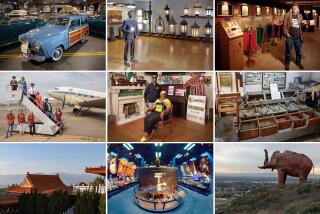Harvesting Relics of an Agrarian Past : History: Ranch yields long-abandoned farm implements, which Bob Pfeiler will add to his proposed museum’s collection.
- Share via
The crusty wooden barrel, lolling in a mud pit and bristling with wild sage, looked more alluring than a treasure chest to Oxnard octogenarian Bob Pfeiler.
So what if a few dozen bumblebees swarmed straight at his face when he tapped on the wood? Who cared if the thing was a century old and obsolete? What did a little rot matter?
Out there on Pine Mountain, in the quiet of Ventura County’s wilderness, Pfeiler had discovered a bonanza for his proposed Farm Implements Museum, which would trace the region’s agricultural history.
The barrel, Pfeiler knew, was part of a wooden water wagon--a bulky, thick-waisted contraption that fed the steam engines that powered the barley thrashers that separated the grain from the chaff back in the 1890s, when barley was big in Ventura County.
Next to the water wagon, Pfeiler found a four-ton Fordson tractor, dating from the close of World War I. He also stumbled across a 19th-Century horse-drawn plow, the first model that provided a space for the farmer to perch.
And that was just the beginning.
Spreaders, scrapers and all manner of antique earth-movers beckoned to Pfeiler, who has collected bits of agricultural history for more than 20 years.
Preserved in the clear, salt-free air of Pine Mountain, nearly a mile above sea level, the wood and metal pieces were in perfect condition. Or at least as perfect as farm implements can be when they’re 100 years old and swamped in slime.
“They are priceless, absolutely priceless,” Pfeiler said.
To rescue his prizes from the Hartman Ranch on Pine Mountain, Pfeiler rounded up a crew of helpers and secured donations of a forklift and some trucks from Oxnard-based Taft Electric.
On a clear mid-May morning, the group headed to the backcountry, where ranch owner Bud Hartman had stumbled across the implements while canvassing his property.
Excavating the tools proved the easy part.
To haul them away, the men had to guide awkwardly laden trucks across two streams, over a rocky path, down miles of winding highway. Finally, they wound up in Pfeiler’s cluttered back yard, hard against an Oxnard strawberry field.
Expedition member and ranch owner Hartman, who also heads up Taft Electric, wasn’t sure what all the fuss was about.
“I really didn’t know what I was looking at, for some of the pieces at least,” Hartman said.
But Pfeiler knew.
In his determined quest to establish a Farm Implements Museum in Ventura County, the 85-year-old lemon rancher has uncovered, cleaned and restored all sorts of old equipment. And he immediately sensed that “this was one of the best finds we’ve ever come across.”
Most of the tools stashed on Pine Mountain were used by the eight Hartman brothers to grow hay around the turn of the century.
Because their soil was lighter than the earth along the Oxnard Plain, the Hartman brothers had to import Midwestern plows, which scoot along the surface instead of churning troughs a foot and a half deep. Eventually abandoned in favor of newer technology, the implements sat for decades, unnoticed.
“I guess it’s just the German ilk not to throw anything away,” Bud Hartman said.
Pfeiler plans to continue that pack-rat tradition.
Until he finds a three-acre plot suitable for the Farm Implements Museum, Pfeiler will store the Pine Mountain cache in his leaky, run-down barn--along with a pack of other dusty heirlooms.
A few dozen of the best samples are on display in a courtyard of the Ventura County Museum of History and Art. But the best way to trace the region’s agricultural tradition is to sniff around Pfeiler’s back-yard workshop.
“These are real keepers,” he said. “Man, we’ve got some beautiful stuff.”
Picking through the barrancas and fields of Ventura County, Pfeiler and other agricultural historians have found samples of most every implement in use before World War II. He can’t even begin to tally how long he has spent on the job.
“A farmer never counts how many hours he puts in,” said Pfeiler, who has worked the land since 1935. “Instead of playing golf or traveling, this is my hobby.”
Over at the county museum, librarian Charles Johnson says he’s glad that Pfeiler picked such a pastime.
“Familiarity breeds jadedness--you see these things around all the time, so you don’t realize that someday they won’t be there,” Johnson said. “Eventually, when they’re hanging in the (farm implements) museum, people will look at them and say, ‘Wow, what forethought to save these things.’ ”
More to Read
Sign up for Essential California
The most important California stories and recommendations in your inbox every morning.
You may occasionally receive promotional content from the Los Angeles Times.













